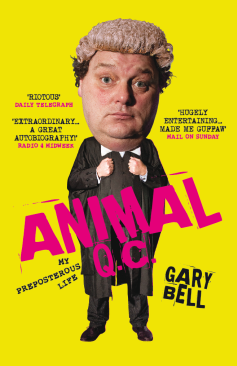Animal Q.C. aka Gary Bell
By Hal Brinton
Published on March 18, 2016

Appointment to Queen’s Counsel is without a shadow of doubt the pinnacle hallmark of legal competency. Affectionately known as taking silk, many yearn for the title.. few seldom get it. Bar those granted the postnominals virtue of honoris causa, (Leeds did exceptionally well this year by the way), its recipients must be practising lawyers of spectacular eminence. As the author of this truly unique book demonstrates, 20 years of graft sounds about right, give or take a year here or there. But why ‘Animal’, you might wonder?
Well In the case of Gary Bell, born and raised in the city where the ‘No 1’ team sports Garibaldi red, the same city misrepresented as the gun crime capital of England and Wales, this recognition alone does suffice in conveying the significance of his achievements. Some by circumstance have to work harder than others. As any reader will learn, and undoubtedly enjoy doing so for the reasonable price of £8.99, this story goes beyond the validation of legal intellect, far beyond! It is perhaps more accurate to describe Gary’s journey as a rollercoaster steeplechase with intermittent foreign adventures, and brushes with the law – all hurling towards the highest echelons of British society. Finally a book to stand on par with Herman Hesse’s ‘Steppenwolf’. Did I mention that the author was a former Homeless Drifter, Fork Lift Driver and self confessed Pork Pie Maker (amongst other things)?
Son of a proud miner, ill – tempered and ruthlessly old fashioned, the childhood expressed in ‘Animal Q.C.’ can easily bring a tear to the eye, toys were certainly few but that didn’t stop Gary. A man on a mission. One prevailing theme throughout is that it’s not what you haven’t got that counts but how you make good use of what you do have. As the Q.C. has said on record:
‘It’s a book about aspiration really, rather than anything else.’
In the opening chapter we are given an exposition of the post war state of the St Ann’s district in Nottingham. The area was condemned a ‘slum’ in the 1960s and 70s. Gary rightly explains that the financial hardships endured by his family were hardly novel. Many people lived hand to mouth and cockroach infestations were a reluctantly accepted norm. Yet despite these challenges, people as people do, survived, no doubt with the help of one another. It seems that happiness and purpose in St Anne’s at the time was forged through a seemingly unbreakable community spirit, a rarer thing nowadays perhaps. Still to this day though, you can hear the distinctive cries of the rag and bone men in certain districts of Nottingham city. No more horse and cart however; they have gone for good. It’s cars and microphones now.
The circumstance of Gary’s mother, Maureen, an avid reader and to whom the book is dedicated is equally capable of rousing feelings of pathos in the reader. She rarely left the house, and by convention, gave way from the opportunities that life may have afforded, to the frankly patriarchal ‘back breaking’ servitude required of many a mother in those days.
One description of how Gary’s father Terrance would flick cigarette ash on the floor for Maureen to clean up is however, particularly telling. There is a saying amongst some that ‘ash stops the carpet from growing’. Irrespective of what one thinks of that, Terrance’s conduct quite simply amounts to contempt and control, undoubtedly perpetuating 19th century attitudes towards women that are redolent of female servitude and Gary is understandably quick to note it. One could comment that new ideas have come in since, but in reality we all know that the pecking order is still evident, it just depends on how one decides to implement it. Perhaps that is why some choose to get away; explore and embark upon their own journey.
On education the book’s observations are equally relevant. Schools then, much like today can be a dire experience for some, even without the corporal punishment. Life can be ruthless!
A natural intelligence however saw the future Q.C. pass his 11+ examination with flying colours. The reward? A rightly deserved scholarship at Nottingham Boys’ Private High School, the same institution that the likes of D.H. Lawrence had attended.
Gary was not to realise such an opportunity, however. A culmination of ‘political dogma’ and his father’s ‘lack of interest in education’ soon saw him being found a place at Toot Hill Comprehensive, something the author honourably declines to decry. In fact, he writes with clarity and integrity when he says that he would have undoubtedly ‘trodden a more conventional path’ had he attended the High School – perhaps to the extent that he would not have written ‘Animal Q.C.’, thank heavens then, that he didn’t go! Laughs aside though, something worthy of mention and one that the author humbly omits is that such scholarships are far from doled out ‘willy nilly’ in order to satisfy some ‘underprivileged’ quota. Only those with the highest grades at County level are afforded such chances. Ask The Rt. Hon Kenneth Clarke Q.C. MP. – .he’ll tell you!
Beyond school, Gary like so many who had been reliably informed that they were only good for menial labour was jettisoned circumstantially into the world of tedious and repetitive work. It is as the author states, ‘a terrible scandal’ and one which perhaps prevails to this day and dictates which type of employment supposedly befits working class children. He does right in exposing it and in fact has recently written a ‘Guardian’ piece commenting on Social Mobility and University Tuition Fees. Clearly the book is full of hard seen and insightful description regarding the status quo of British society. His observations however, on the working classes as cannon fodder for imperial conquest is particularly thought provoking. It’s hard not to agree!
Whilst in the world of intellectually dissatisfying work, Gary like many a young working class man is drawn into the seductive and dangerous world of football violence. Coach trips for the away games, supplemented by lager, and ‘Mr Kipling Bakewell’ tarts is certainly one way to feel purposeful. It touches a nerve though at the roots of British sensibilities and cannot be overlooked. It is a reality! Illegality aside, the sound morality of Gary and some of the other men is evident when sharing equal disgust for the behaviour of the so called ‘ferret’ who attacks a helpless child. There is a strong omniscient sense that this life is not for Gary, and as a reader you can’t help but think ‘mate you’re too smart to be getting caught up in this’, but again it is circumstance permitting. Time to travel.
There is a quintessentially British sense of fair play within the narrative; the German escapade concerning a British Garrison and a ‘Day-Glo’ tent is humorous, albeit frightening for the participants. You literally could not make this stuff up and if you did, few would believe you. A great shame and no surprise to many!
At times ‘Animal Q.C.’ reads like a John King novel – the difference being that one is fiction and one very evidently fact. It is here that we learn just how remarkable Gary’s story really is and how very easily things could have descended into an irreversible inferno. Aptly quoting Rutger Hauer’s android in BLADE RUNNER ‘I’ve seen things you people wouldn’t believe’ Gary gets it right when asserting ‘its been a preposterous life’. It has and that is all the more reason to tell it. Incidentally, those familiar with the quote may know that Hauer actually improvised part of the monologue. He literally wrote his own script, much like Gary has by taking back control of his life by drafting his own brief. Inspirational!
Extraordinary foreign escapades, and a tragic incident in which Gary’s life could ‘have gone very differently’ sees the author fulfilling what to the reader seems like destiny. I would have pigeon –holed him for philosophy though, but to our surprise and of course to much joy of those he has represented, Gary decided upon a law degree. Champion debater, mingling with high society and finding love in the right place; one can’t help but think that his is a work of fiction, but actually, it’s not. Like many of the greats, Gary has achieved something that all humans have the ability to do, but few realise that they can, and that is quite simply being the best that they can be. The first step is saying ‘No, I refuse to have my life dictated by circumstance.’ This is surely an example of the great British pride coming to the fore. Success has no limits – it evolves like a creature borne to survive – much like our judicial system no doubt!
What lies ahead for Gary in the future? some might ask. Well, as a mere reader, I could not possibly comment. It is beyond predictive theory much like his life. Denning had to go through war before becoming a member of the judiciary; arguably Gary already has – and what a better person for it!
So how one might wonder does the man from St Anne’s, ‘known to the law’, with insatiable appetite for football achieve that which the Bar Councils Kalisher report termed ‘the badge of the eminent and successful barrister’ ? The answer, skill, a strong moral compass, friends and a dogged determination.
Any why ‘Animal’ you might again enquire ? Well for that you will have to read it for your bloomin’ self!
The Author

Hal Ian Brinton is an academic lawyer studying at the University of Leeds. He began his legal career at Ruskin College Oxford which is a model for labour colleges around the world.
Coming from a political background and influenced by Ruskin’s long and varied history, Hal committed himself to social justice policy and equality.
His current research interests are, Human Rights, Feminist Jurisprudence, Legal Aid Reform, Anti Discrimination Law and the Law of Obligations.
Hal was a co-editor with The New Jurist.


